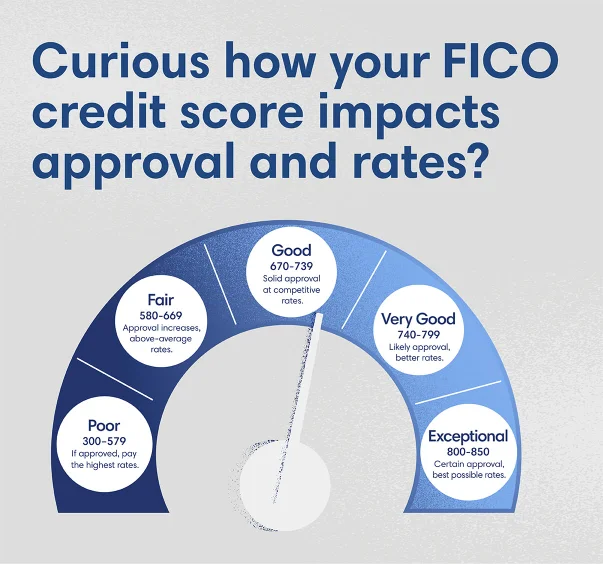Guide to credit scores
Credit is an important component of your financial health, and your credit score is an integral part of this mix. Because it can have such a significant impact on your finances, it's important to build credit history, have good credit and check your score frequently—especially before applying for a new credit card or loan.

It doesn't matter if you're just starting out and don't yet have a credit history or your existing credit score could use a boost. Either way, you can use these strategies to build and improve your credit for a stronger financial future. But first, a primer on credit scores and what they mean.
What is a credit score?
A credit score is a snapshot of your potential ability to repay a lender. Your credit score report is a breakdown of your credit history that shows your payment history, loan balances and open accounts, among other key financial information.
Why is it important to have good credit?
When you want to borrow money from banks, credit card companies and other lenders, they'll commonly check your credit score to get an overview of your financial history and gauge how likely you are to repay them.
The credit score range runs from 300 to 850 and is used by lenders to determine your creditworthiness. The higher your credit score, the better. Having a good credit score could mean better interest rates on personal loans, while having a poor or even fair credit score might make it more difficult to get a loan, rent property, open new accounts, or get a job.
What is a good credit score?
Each of the three major credit reporting bureaus—Experian, TransUnion and Equifax—calculates its credit scores in slightly different ways, so there's no definitive number that makes a good credit score. However, a good credit score range is anywhere from 661 to 780, while an excellent credit score is generally anything higher than that.
How are credit score ranges calculated?
Understanding how credit score ranges are calculated—and who calculates them—is just as important as knowing your credit score.
FICO
The Fair Isaac Corporation, called FICO®, is the most common score model and the industry standard. If you're curious about how your credit score impacts approval and rates, see the FICO credit score range below.

Curious how your FICO credit score impacts approval and rates?
- Poor: 300 to 579. If approved, pay the highest rates.
- Fair: 580 to 669. Approval increases, above-average rates.
- Good: 670 to 739. Solid approval at competitive rates.
- Very good: 740 to 799. Likely approval, better rates.
- Exceptional: 800 to 850. Certain approval, best possible rates.
VantageScore
VantageScore® uses another score model that was developed in partnership among the three credit reporting bureaus. Its credit score range is slightly different, but the outcomes are similar for each category.
- Very poor: 300 to 499
- Poor: 500 to 600
- Fair: 601 to 660
- Good: 661 to 780
- Excellent: 781 to 850
The primary difference between the two scores is that FICO pulls in data from each credit reporting bureau individually and then combines them to develop a score, while VantageScore uses a weighted average of the three bureaus to calculate a credit score range.
How are credit scores calculated?
Credit scores are largely based on information lenders provide to the credit reporting bureaus. Just like with credit score ranges, there are slight differences in how FICO and VantageScore calculate scores. It's why your rating may be considered fair by FICO and good by VantageScore, depending on which bureau pulls your credit report.
FICO uses this formula to calculate your credit score.
- 35%: Payment history, including the number of late payments and how late they were
- 30%: Amount owed, which is the ratio of how much debt you have to pay to your available credit
- 15%: Length of credit history, or how long your accounts have been open
- 10%: Credit mix, or the types of credit or personal loans you have
- 10%: Recent credit applications, which result in inquiries on your credit report
If you opt in to an UltraFICO™ credit score, it will include more information about your bank accounts in its calculation. This is often a good option for those with low or no credit.
While VantageScore doesn't reveal much about its formula, it uses a system that ranges from extremely influential to less influential.
- Extremely influential: Total credit usage, the amount owed and available credit
- Highly influential: Credit mix and experience
- Moderately influential: Payment history
- Less influential: Age of credit history and recent credit applications
These scoring models factor in the credit checks lenders make when you apply for new credit. Any hard inquiries to your credit have a slight negative impact on your score because they indicate that you're looking for credit. However, one or two inquiries won't have a big impact. Just avoid making too many credit inquiries at once.
Which credit score is the most important?
According to Experian, more than 90% of top lenders use FICO scores to evaluate borrowers' creditworthiness. Interestingly, there are different scoring models for FICO scores. The big three credit bureaus use the FICO 8 scoring model, which is popular for general use. However, lenders may choose a different model depending on the type of credit involved. For example, mortgage lenders tend to use FICO scores 2, 4 and 5. Knowing which credit score is most important for the type of credit you want can help you prepare before you apply.
How to check your credit score
Checking your credit report is critical because it has such a direct connection to your credit score. Each year you're entitled to a free copy of your credit report from Experian, TransUnion and Equifax that you can access through AnnualCreditReport.com. Due to hardships caused by the COVID-19 pandemic, you can also get them weekly at AnnualCreditReport.com through December 2022.
If you ask for a report from a different bureau every four months, you can get a free credit report three times a year. You can get six free credit reports per year by visiting Experian's website through 2026 as part of a data breach settlement.
Because these credit reporting bureaus may get information from different sources—and because this can affect your score—it's important to review reports from all three.
When reviewing your credit reports, do a thorough check of all information. Look for signs of errors or fraud that may include:
- Mistakes in personal data like your name, Social Security number or address
- Incorrect current balances
- Inaccurate information about late or missed payments
- Newly opened accounts you don't recognize
- Hard inquiries made without your permission
If you see a discrepancy, contact the bureau whose report you're viewing and the organization that reported the filing you suspect is incorrect. Provide documentation to assist both as they investigate the dispute.
You can also use two free tools that can prevent fraudsters from opening unauthorized accounts. A one-year fraud alert requires potential lenders to verify your identity before issuing credit in your name, while a credit freeze blocks prospective lenders from accessing your credit report until you lift it.
Building credit with credit cards
If you need to start building credit, you'll first need to show how you handle smaller amounts of debt. Using credit cards to pay for small purchases can be a good first step. By using a basic credit card and making on-time payments, you can generate a balance that helps establish a payment history. You also might eventually be able to upgrade to a credit card with more perks and lower interest rates.
Look for the following features when choosing a card.
- Credit limit: A lower spending limit will keep your balance down until you're comfortable using credit.
- Interest rates: Keep an eye on the interest rates of each card offer you evaluate. Some cards offer low introductory rates, which increase after a set period.
- Fees: Credit card issuers may charge fees for late payments, cash advances, foreign transactions and rewards programs. Compare fees among cards and choose one that fits best with how you intend to use it.
- Digital access: Find out whether you can access your account online or through a mobile app to monitor your spending and payments throughout the month.
- Fraud protection: Under federal law, customers are only legally liable for $50 on fraudulent charges, but many issuers won't hold customers responsible at all. Most major cards offer zero-liability protection on fraudulent transactions or stolen cards. Review any credit card offer for information on your responsibility to report a lost or stolen card or suspicious charges on your account.
- Rewards programs: As a first-time cardholder, you may not be eligible for the highest rewards level, but pay attention to additional perks and programs that may be available as you establish your credit.
If you want even tighter controls, look to a secured card option where you put up the collateral—usually a deposit of $200 or more. Because your limit is the amount of your deposit, you don't need as strong of a credit score to qualify. Once you have it, you can build a history of on-time payments and responsible credit management to qualify for better cards, including conventional, unsecured cards with better perks and rewards.
Other ways to build credit history
Building credit takes time. As an example, you need to have an account open for at least six months to be able to get a FICO score. And any negative information like late payments can stay on your credit report for up to 7 years.
The good news is that you can start implementing some best practices right now to establish credit or improve your score.
- Pay bills and rent on time. Late or missing payments can harm your credit.
- Don't rely solely on cash. Some people have poor or no credit because they don't use the banking system. To ensure your payments help build your credit, open both a checking account and a savings account.
- Borrow money that you can easily pay back. Take out a small loan or open a credit card with a bank or retailer to help establish a credit record. Then make regular, on-time payments to demonstrate financial responsibility.
- Don't apply for a lot of credit at once. Trying to take on too much debt at one time may lower your score. Keep just a few accounts open and active to establish a long-term history with these credit card companies, which can improve your score.
- Ask if your landlord will report your rent payments to the credit reporting bureaus. If your landlord agrees, your on-time payments can help build your credit, particularly with Experian. You can also use a rent reporting service to report rent yourself, although there are fees.
Tips to improve your credit score
Improving your credit score is more of a marathon than a sprint. Start with these habits and stick to them over time, and you can work your way toward excellent credit no matter your current financial situation.
Pay bills by their due date. Your history of paying bills on time is the most influential factor in your FICO credit score because it indicates how likely you are to repay the money you borrow. Use automatic payments and set up reminders to ensure you never miss a payment. If a missed payment does occur, correct the error as soon as you realize it. Some late payments may not be reported to credit reporting bureaus until they become more than 30 days past due.
Limit how much you owe. When it comes to credit card and loan balances relative to your available credit lines, less is more. Aim to keep balances less than 30% of your available credit line and less than 10% of your available credit. If you have a $2,500 credit line, for example, avoid having a balance that exceeds $750.
Keep your oldest credit accounts active. While there's no quick path to adjusting the length of your credit history, keeping the credit cards you've owned the longest open, active and in good standing may have a positive impact on your score. Because creditors might close accounts if you haven't used them in a while, consider putting a small recurring payment on your oldest cards so they don't get closed due to inactivity.
Diversify the type of credit you own. You can improve your credit score by owning different types of credit. Credit cards, for example, are considered revolving credit—you're granted a line of credit and can choose how much of it to use based on purchases you make. As you pay back the amount of those purchases to the creditor, your available credit line replenishes. Auto, student and home loans, on the other hand, are considered installment accounts—you're granted a loan for a certain amount and make monthly payments until the loan is paid in full. You can boost your score by managing both types of accounts responsibly and making payments as agreed.
Alternate using credit and debit cards. Limiting your reliance on credit cards is important, but so is demonstrating that you can manage credit responsibly. Debit cards don't involve credit, so their usage isn't reported to credit reporting bureaus. While making every purchase with a debit card is a great way to avoid creating a credit card balance you can't pay in full, it's also not helping you build credit. Instead of swearing off credit cards for good, use them for making occasional smaller purchases—and commit to paying off your full billing statement amount each month by the due date. This is a great way to learn how to use credit with boundaries in place.
Above all, it's important to check your credit report at least once a year. This way, you can look for areas of improvement and fix any errors you see before they become bigger financial hassles. When it comes to keeping your own credit status, there's no downside to staying in the know.





